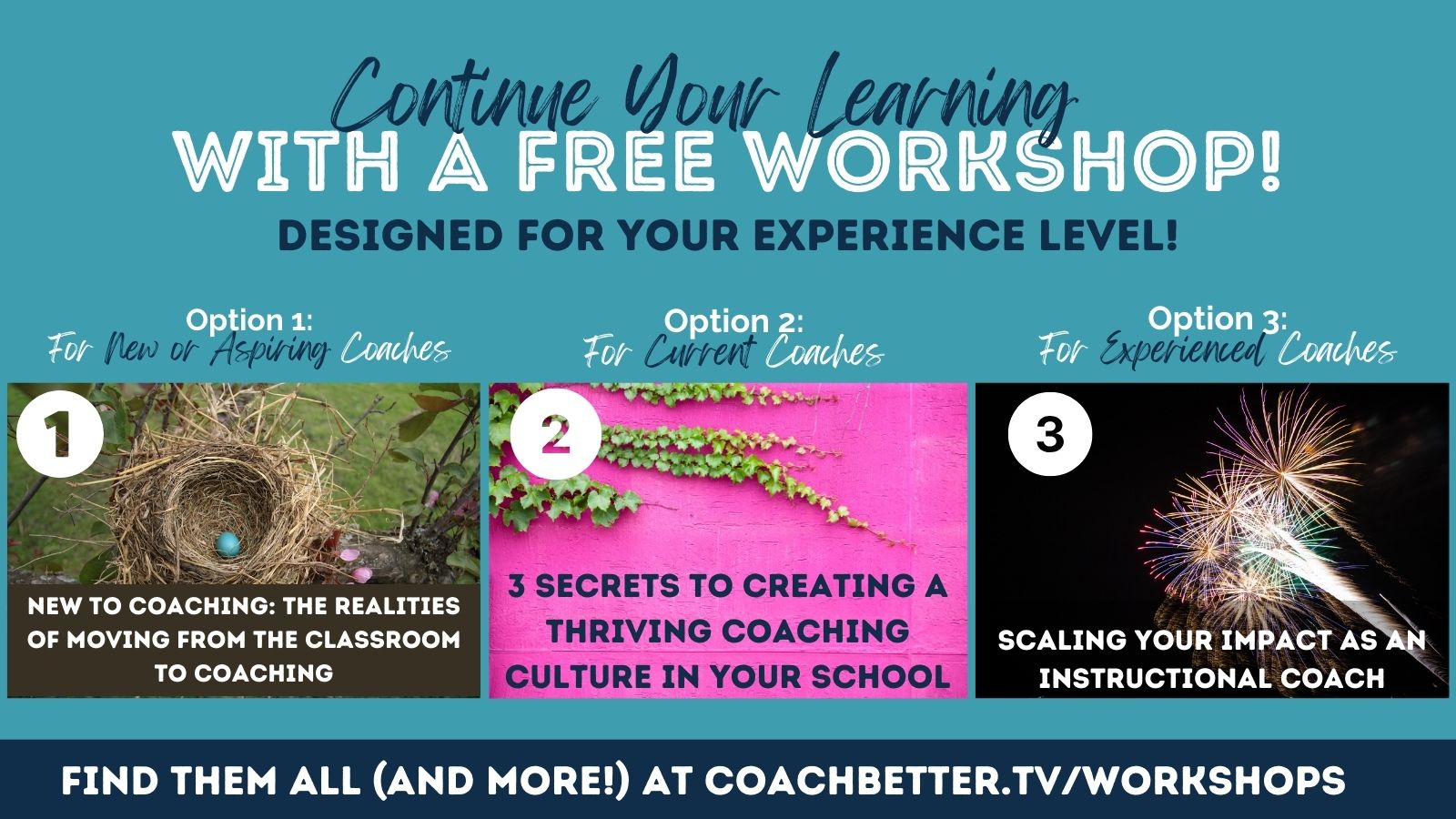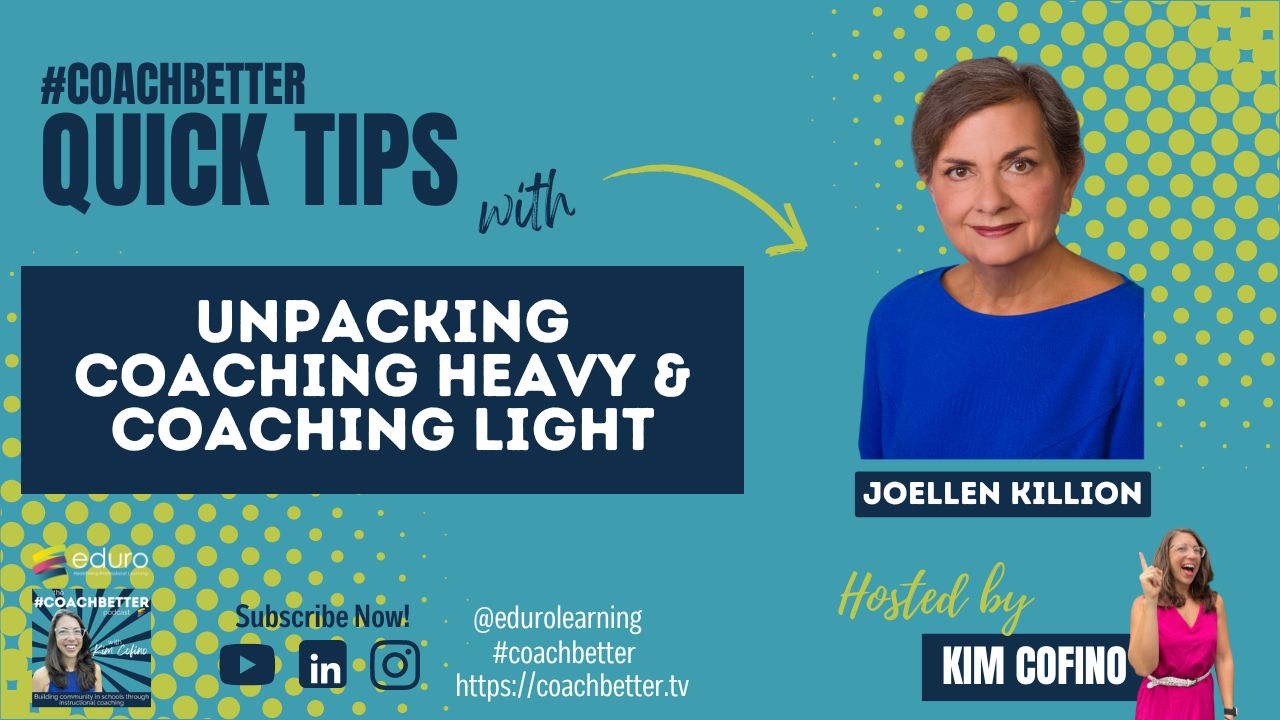In today’s episode we’re talking about one of my personal biggest “aha” moments in my coaching career: when I uncovered the concept of coaching heavy vs coaching light.
This is a highlight from one of my favorite episodes from a previous season. If you’re a longtime #coachbetter listener, you know that Joellen Killion is my instructional coaching superhero, and her episode from a few seasons ago was a masterclass in all things instructional coaching.
This episode is a perfect introduction to thinking about, and reflecting on, the type of coaching support you’re providing to your coaching partners. So many of my clients get stuck in the “advice trap” or constantly feeling like they have to prove their worth to potential coaching partners by being on demand for resource support. This conversation with Joellen highlights an essential mindset shift for instructional coaches. As Joellen says: Results can build relationships as relationships can build results.
If you’re finding yourself stuck in the mindset that you need to build relationships before you can see results, you are going to love this clip with Joellen!
And if your goal is to be more intentional and strategic in your coaching practice and program this academic year, so that you and your coaching partners see the results they are working towards, you can put all of this into practice in The Coach Certificate and Mentorship Program (see more details at the end of this post)!
What’s YOUR level of coaching mastery?
All coaches go through various stages of coaching mastery. Once you identify where you’re at, you can begin to build the skills needed to move to the next stage.
This quiz is based on real-life case studies compiled from years of working with coaches inside The Coach Certificate & Mentorship Program!
When you receive your results, you’ll also get your matching case study from the STRIVE Case Studies to see where you fit in the stages of coaching mastery.
Ready to tackle your challenges and move on to the next level in YOUR coaching practice?

The STRIVE Model of Coaching Mastery quiz will help you identify your level of coaching mastery by matching you with case studies compiled from years of working with coaches inside The Coach Certificate & Mentorship Program so you can easily see where you fit!
When you complete the quiz, you’ll get:
- Your matching case study,
- Specific strengths & challenges aligned to your result;
- Suggested next steps for each stage;
Plus the Case Study Document includes:
- Case studies leveled by coaching mastery;
- A framework to identify essential stages of professional growth & key areas to focus on in your professional learning;
- Alignment with the THRIVE Model for a Successful Coaching Culture;
- Space for you to reflect & prioritize so you can take action immediately!
You’ll go straight to the Quiz, and get the Case Studies by email
Understanding Coaching Heavy and Coaching Light
Joellen says…
I was working with a school system over 10 years, and we found that teachers were continuing to ask the same question over and over again: how do I build a relationship with the teacher I work with. They had built an assumption that it was relationships before results. I’m not sure that was an accurate assumption: Results can build relationships as relationships can build results.
Results can build relationships as relationships can build results.
Coaching light: coaching for relationships
Coaching heavy: coaching for results
When coaches saw their work only from the lens of helping teachers feel better & supported, being valued and appreciated as coaches, they ran up against a wall: the wall of results.
The question became: “How do we get through the worry about “maybe they won’t like me” if I raise the question about students not learning in their classrooms, to get to the point where we’re talking about results?”
It’s about putting results for high quality teaching and learning in the forefront and keeping that in our view at all times, and holding ourselves accountable.
All coaches, regardless of how long they’ve been coaching, really do want to see results, and it is through results that teachers appreciate the value of coaching and come to appreciate their coaches.
The reason we’re in our positions is to produce better results for the teachers & the students.
When we get pushed into our discomfort, it’s in that space that we have our greatest opportunity for learning. It’s not discomfort with judgment, it’s creating enough dissidence to encourage us to want to look at our practice as an opportunity for growth.
Instructional coaches need to focus on creating a safety net to take that risk. Enough safety and sense of being supported, creates a feeling that “I can fail here and it will be ok”.
How can you make the shift to coaching heavy?
One strategy that really is helpful is to encourage our clients to articulate what they really want, and what it looks like when it’s successful.
We can begin by asking, what..
- are they are striving to accomplish?
- do they want to gain?
- are the indicators of what it will look like, sound like and feel like?
And in this space, what will…
- the teacher will be doing?
- students be doing?
All of that conversation creates the picture of what your coaching partner is striving for.
That conversation builds ownership for achieving it.
The coach is listening, capturing, probing and encouraging, our clients to be more thoughtful and analytic with what they want.
It’s in that depth & specificity that we can really help our coaching partners.
We can ask our coaching partners to describe when they get to their goal point, by asking…
- How will you feel?
- What will be the benefit for you? For your students?
When we describe it in that way, we are helping our clients self-assess. To be in charge of monitoring their own progress.
If I can describe it with specificity, it is far more likely to be achieved, than if I don’t have the capacity to be specific. More time on the what, and less time on the how.
We do that backwards in schools. We spend a lot of time on the how without clarity on the what.
Watch the Video
Keep Learning
If you’re ready to dig deeper into being more intentional in your coaching practice – or if you’re new to instructional coaching and you’re curious about getting started, join us for one of our courses for coaches!
We have programs to support you in every stage in your journey. From new coaches moving from the classroom to a coaching role; to current coaches ready to be more intentional and strategic in their practice, to experienced coaches, ready to lead. Find them all at coachbetter.tv/learn
Free Workshops for Instructional Coaches
If you’re ready to keep learning, try one of our FREE workshops where you’ll be able to dig deeper into the concepts in this post, and get a peek at all of our courses for coaches.
We have workshops (and courses) to support coaches at every stage of their career: from new and aspiring coaches making the move from classroom to coach; to current coaches ready to be more intentional and strategic in their practice; to established coaches leveraging their coaching experience to lead.

You can them all on our coachbetter website at coachbetter.tv/workshops
If you’re curious right now, you have questions, please reach out. You can leave a comment below, join our #coachbetter Facebook group, or find us on social media at Eduro Learning and send me a DM. I’d love to support you on your coaching journey. See you next time!
Connect with us!
Subscribe to the podcast iTunes |Spotify|Stitcher
Follow us on social media: Instagram |LinkedIn
Join our #coachbetter Facebook group

Recent Comments